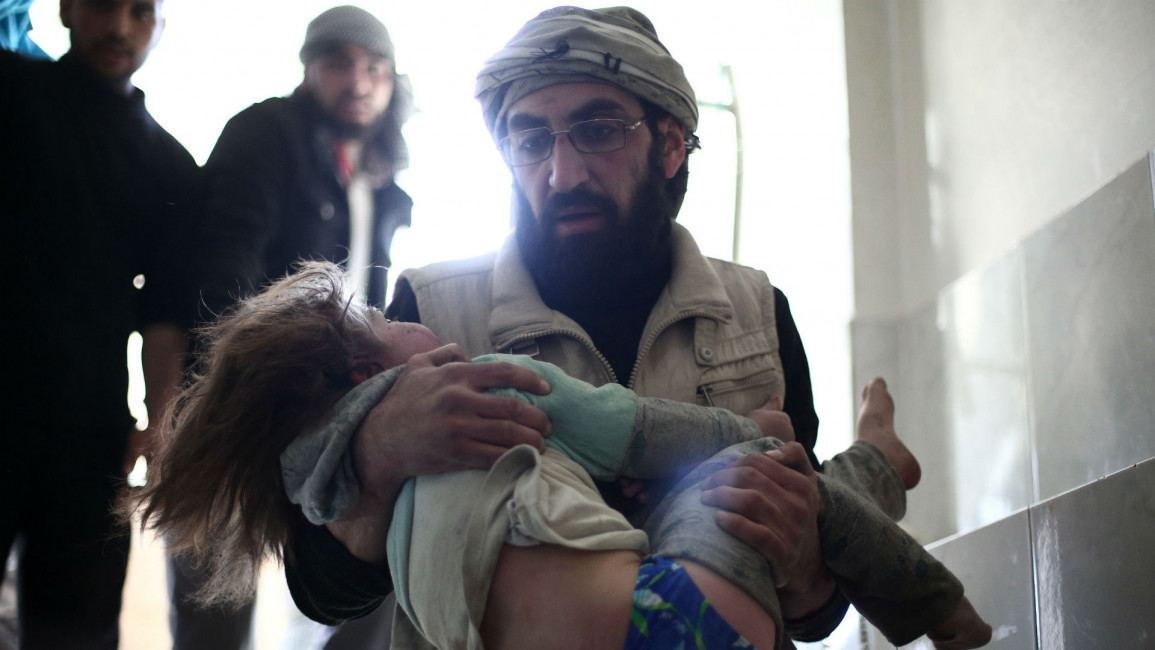Douma: Medical services 'beyond breaking point' after Syrian bombardment
Syrian regime airstrikes on Douma and the Eastern Ghouta province have been so severe that medical services have not been able to treat the injured, it has emerged.
The aerial campaign has killed nearly 200 people and injured hundreds more over the past ten days in the rebel-held area, east of Damascus. The fatalities include at least 29 children, according to the London-based opposition group, the Syrian Observatory of Human Rights.
"The number of patients treated in the hospitals we support has gone beyond breaking point," said Dr Bart Janssens, director of operations at Medecins Sans Frontieres (MSF).
"The number of requests for medical supplies has shot up."
The Eastern Ghouta province has been subjected to a suffocating seige by President Bashar al-Assad's army and frequent regime airstrikes over the past year and a half. But the bombardment has been especially intense in recent weeks. Medical services are overwhelmed.
| The number of patients treated in the hospitals we support has gone beyond breaking point. - Bart Jannsens, MSF |
On 5 February, two medical facilities were bombed, and a nurse was killed on his way to work in a hospital on 8 February, MSF said.
"These incidents are in no way unique - they are part of an ongoing pattern of unimaginable violence," Janssens said.
"Our work is almost an impossible mission," said a Syrian paramedic in the beseiged area who wished to remain anonymous for safety reasons. "Fuel is scarce and we have no personal protection gear, such as helmets."
Resources exhausted
Airstrikes hit a crowded market square in Hammuriyeh on 23 January. As many as 42 people were killed in that bombing, reported the Observatory, which relies on a wide netowrk of sources within Syria.
"Our hospital, like the majority of hospitals in the region, lacks basic equipment and medical supplies, and we have limited capacity," said the director of an MSF-supported hospital. "We have just one basic machine monitoring vital organs."
Thanks to poor sterilisation and available anaesthetics, "we had to perform surgeries unconventionally", said the director - who asked not to be named for fear of regime reprisals.
"Paramedics were running and bringing in more wounded people, so I realised there was a catastrophe going on," he said.
"The medical situation and the general living conditions are beyond any red lines and alarm bells have been ringing in vain for a long time," he warned.
| Alarm bells have been ringing in vain for a long time. - Hospital director |
MSF - renowned for operating in hazardous environments - pulled its staff out of Syria last year because it had become too dangerous, but now works with local medical centres, providing supplies and health facilities.
Strategic site
Douma and the Ghouta region have played an important role since 2011, when the Syrian conflict began. Douma is also strategically important as it is the centre of the Rif Dimasq governate, which surrounds Damascus.
Douma was a major rebel stronghold when the conflict first started in 2011, but was captured by the Syrian army in 2012. The Free Syrian Army recaptured it in October 2012, and the fighting has continued.
Douma and other towns in the Ghouta area were hit by bombs filled with the chemical Sarin in 2013.
One week ago, airstrikes killed 88 people in almost 40 aerial raids in the Eastern Ghouta, after rebels fired around 70 mortar bombs and rockets into the city of Damascus, killing seven.
Further regime bombardment killed 15 and injured 70 in Douma on Tuesday morning, even as the UN special envoy to Syria, Staffan di Mistura, visited Damascus to attempt to secure a freeze to the fighting in Aleppo province.
Rami Abdulrahman, of the Syrian Observatory for Human Rights, told al-Araby al-Jadeed that he thought the airstrikes would continue. "They just wait for the weather to be OK, and they start again," he said.



